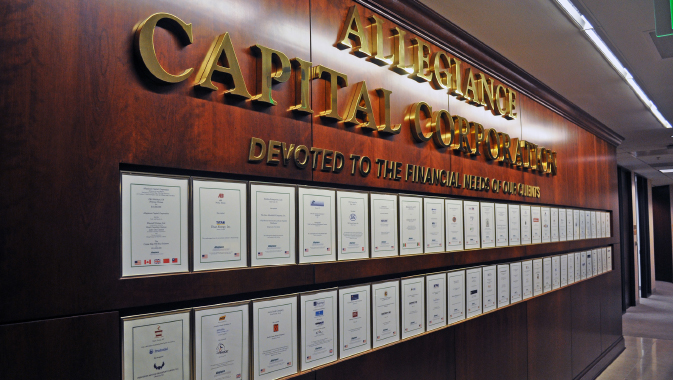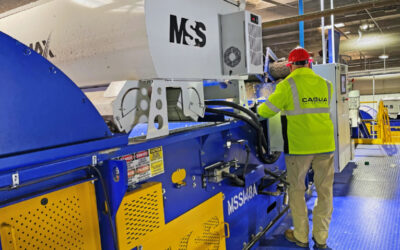Business owners work hard to build their companies and transform their vision into reality. So when it comes time to sell the business they have devoted their lives to, owners deserve the best possible return on their investment. And that’s where a firm like Allegiance Capital Corporation comes in.
~
Since its founding in 1998 by Chairman David J. Mahmood, Allegiance Capital Corporation has become one of the most respected private, middle-market mergers and acquisitions investment banks in America. From its corporate office in Dallas and locations in Chicago, and Monterrey, Mexico, Allegiance Capital has earned a reputation for getting the best results for clients seeking to sell or finance their businesses.
Allegiance assists entrepreneurs in many industries in every aspect of selling and financing their businesses, including debt restructuring, mezzanine financing, leveraged buyouts, strategic partnering, consulting and other related services. Allegiance also has extensive global reach and capabilities as a member of international partner organization, Globalscope.
In addition, Allegiance invests hundreds of thousands of dollars in databases to identify buyers throughout the world. Through this access to data and its relationship with Globalscope’s more than 57 investment banking firms and their more than 600 investment bankers across the globe, Allegiance can bring in more investors to drive up the sale price for clients.
“Our hallmark over the years has been our ability to generate a premium price for our clients,” says Mahmood. “And since we work on commission, it is beneficial to us, because we sell the companies for more money, earn more in the way of commission, and have happier clients.”
Prior to founding Allegiance, Mahmood sold many middle-market and lower middle-market companies during a ten-year career in investment banking. And since founding Allegiance Capital Corporation, he has sold some two hundred more.
He is a serial entrepreneur, who has started a total of eight businesses during his 50-year business career. His background gives him a great appreciation of the goals that owners seek to accomplish when they sell their companies and also of the realities of operating a business. Six of his earlier enterprises were successful, but Mahmood acknowledges that one was a “spectacular failure,” and it was this misstep that taught him a great deal.
The business that failed sold high-end leather furniture. It was 1980, and Jimmy Carter was president when interest rates hit 21 percent. “People stopped financing purchases,” Mahmood says. “Furniture is a deferrable expense. It’s the first purchase to go when interest rates get high.”
Previously, he’d received an offer for his business, but chose to keep it. That turned out to be a bad decision, and he ultimately had to liquidate at pennies on the dollar.
“I learned that while it’s good to be focused on your business, you also have to know what’s going on in the economy,” he remembers. “If not, it can come back to bite you.”
In 1998, Mahmood founded Allegiance Capital at the age of 60 when most people are slowing down. Today, at 78, he is proud to share his many years of experience with clients.
“I may not know everything you should do in a deal, but I know almost everything you should not do,” says Mahmood. “That’s the benefit of being a serial entrepreneur. I can appreciate the feeling of waking up in the middle of the night and trying to figure out how to meet payroll for the week or make a payment to the bank. Those are the types of things almost every entrepreneur experiences along the way.”
He also appreciates the opportunities open to business owners today by virtue of some $3 trillion that is sitting on the sidelines waiting for the right opportunity to invest.
“The demand for lower-middle and middle-market businesses exceeds supply,” he says. “That means it’s a strong sellers’ market. Companies are attracting offers at high multiples of EBITDA (earnings before interest, taxes, depreciation and amortization). In fact, the multiples that investors are paying are at levels not seen since 2006, before the global financial crisis of 2008. Privately-held businesses that once sold for five or six times EBITDA, are now selling for seven, eight, even nine times.”
Mahmood says it’s a great time for business owners to cash out, or if they want to remain involved in the business, “to take some chips off the table” by selling some equity to a private equity group or other investor.
“Valuations are at nosebleed levels, buyers have capital, banks are lending, and bank money is still relatively cheap,” he says. “All of these factors have aligned to create a really interesting market.”
Another factor is the impact of America’s aging population. The oldest members of the baby boomer generation were born in 1946, putting them at 71 years old. Of the present U.S. population, 74 million are baby boomers.
“This will cause the greatest generational transfer of wealth in the history of the United States,” says Mahmood, adding that millennials, unlike children of the past, do not have the same interest in taking over their parents’ businesses. This leaves older business owners in a prime position to sell to another party, and do so at higher multiples.”
But these ideal conditions will not be around forever. Mahmood believes the current stock market is in a state of “exuberant anticipation” based on the Trump Administration’s pledge to lower corporate taxes and to invest a trillion dollars in infrastructure projects such as rebuilding roads, bridges and dams.
“I have followed commodities all my life, and while things can shoot up rather spectacularly and quickly, when the market turns, they can go down just as steeply and just as fast as they went up,” he adds. “The time to sell a business is when it is doing well.”
That’s why he strongly recommends that the time to sell is now. He believes the current bull market won’t last more than another two years, which may sound like a long time, but business owners generally have no idea how long it will take to sell their business.
“Not only is it going to take nine months to sell the company, but most acquirers want the business owners to stick around and pass along their institutional memory,” says Mahmood. “So if a business owner decided to sell today, it still might be two to three years before he or she can actually walk away from the business and enjoy the rest of their lives.”
That’s also why it is so critical to have the best guidance possible for what is likely to be the most important transaction of a business owner’s career. To ensure the process of selling goes as smoothly as possible, Allegiance Capital works closely with business owners at every stage. The firm has created what it refers to as the ten critical steps of selling a business, and its team handles everything from creating a detailed, professional analysis of the business to marketing the business and securing the highest price from a qualified list of investors.
“There is a logical reason that people really should stop and think about this market and the opportunity it presents,” says Mahmood. “Very simply, people who plan are more successful than people who don’t.”













